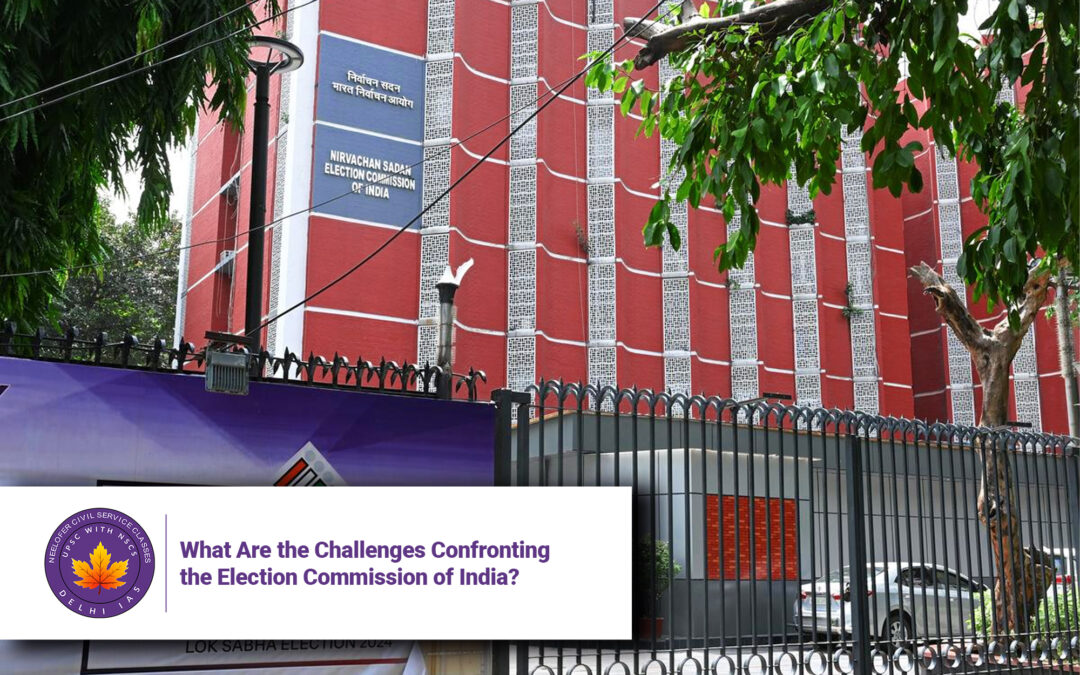What Are the Challenges Confronting the Election Commission of India?
Why in News?
The Election Commission of India (ECI), one of the most important constitutional bodies of the country, has found itself in the middle of a political storm. On August 7, Congress leader Rahul Gandhi accused the ECI of large-scale electoral roll manipulations in the Mahadevapura Assembly constituency in Karnataka. His allegations were not isolated; they came amid growing criticism regarding the recently conducted Special Intensive Revision (SIR) of electoral rolls in Bihar, which allegedly saw lakhs of voters missing, duplicate registrations, and discrepancies.
The issue has raised fundamental questions about the credibility and neutrality of the ECI, an institution mandated by the Constitution to uphold free and fair elections. The matter has now reached the Supreme Court of India, which has stepped in with interim directions while hearing petitions challenging the SIR exercise in Bihar. The controversy has paralysed Parliament sessions and reignited debates about the autonomy of the Election Commission.
Introduction
The Election Commission of India (ECI) is often regarded as the guardian of Indian democracy, tasked with conducting free and fair elections to Parliament, state legislatures, and the offices of the President and Vice President of India. However, in recent years, the institution has faced repeated charges of partisanship, inefficiency, and lack of transparency.
The latest controversy revolves around the Special Intensive Revision (SIR) of electoral rolls, carried out ahead of the Bihar Assembly elections. The opposition has alleged that the SIR was riddled with irregularities—missing names, duplicate entries, unverifiable voters, and faulty deletions. These discrepancies have a direct bearing on the fairness of elections, as they can potentially disenfranchise genuine voters while opening the door for manipulation.
Rahul Gandhi’s allegations in Karnataka, combined with the uproar over Bihar’s electoral rolls, have pushed the ECI into the spotlight. For an institution that prides itself on neutrality, the ongoing debates raise a fundamental question: Is the Election Commission still capable of ensuring the integrity of India’s electoral democracy?
The Mandate of the Election Commission of India
The ECI is a permanent constitutional body, entrusted with the responsibility of supervising and controlling the entire process of elections.
-
Article 324 of the Constitution vests the ECI with powers to direct and control elections to Parliament, state legislatures, and the offices of President and Vice-President.
-
Originally, the body consisted of only the Chief Election Commissioner (CEC). Later, it was expanded to include two additional Election Commissioners.
-
Recently, Parliament passed a law—the Chief Election Commissioner and Other Election Commissioners (Appointment, Conditions of Service and Term of Office) Act, 2023—to govern the process of appointing members of the Commission.
The ECI’s credibility has historically rested on its independence and impartiality. However, critics argue that recent developments—especially the appointment process—have undermined that independence.
Why Is the Election Commission in the Spotlight?
The immediate trigger for the controversy is the Special Intensive Revision (SIR) of electoral rolls in Bihar.
-
On August 1, the EC released a draft electoral roll, which showed a drop of nearly 5.6 lakh voters in Bihar compared to the 2025 electoral list.
-
According to reports, the draft list had 65 lakh “missing voters” who could not be traced; many were registered in multiple places, some had migrated, and some were untraceable altogether.
-
Civil society organisations, opposition parties, and NGOs approached the Supreme Court, arguing that the SIR exercise risked disenfranchising lakhs of genuine voters.
The Court, in an interim order dated August 14, directed the EC to publish a fresh enumerated booth-wise list of the 65 lakh electors not included in the draft roll. The Bench of Justices Surya Kant and Jotaymalya Bagchi stressed the importance of transparency and ordered the EC to provide reasons for deletion—death, migration, untraceability, or duplication.
Opposition parties have seized upon these issues to highlight the lack of transparency in the electoral process. They have also accused the EC of failing to act against alleged manipulations by ruling parties in different states.
Key Issues and Institutional Concerns
-
Allegations of Manipulation
-
Rahul Gandhi accused the EC of allowing discrepancies in Karnataka’s Mahadevapura constituency.
-
Similar allegations have surfaced in Bihar, Maharashtra, and Haryana, where voters claimed they were arbitrarily deleted from the rolls.
-
-
Lack of Transparency in Electoral Rolls
-
Voter rolls are not easily searchable or verifiable.
-
Opposition parties argue that there is little accountability for wrongful deletions or duplications.
-
-
Autonomy of the ECI
-
Critics argue that the new appointment law, which involves the Prime Minister, a Union Minister, and the Leader of Opposition, still gives the ruling party an upper hand.
-
Questions are being raised whether the Commission can truly function independently.
-
-
Impact on Migrant Voters
-
Migrant workers are among the most vulnerable groups, often finding themselves missing from electoral rolls.
-
The Opposition argues that there is no simple, cost-effective solution yet to allow migrants to vote from where they work, leading to systematic disenfranchisement.
-
-
Judicial Intervention
-
The Supreme Court’s intervention underscores the seriousness of the issue.
-
However, frequent judicial oversight of the EC also highlights a crisis of credibility within the institution.
-
Challenges and the Way Forward
-
Ensuring Accurate Voter Rolls
-
The EC must adopt transparent, digital verification systems that allow voters to check their status online.
-
Use of Aadhaar and biometric linking should be strengthened but balanced against privacy concerns.
-
-
Addressing Migrant Voting Rights
-
India must explore remote voting mechanisms, possibly through postal ballots, secure digital platforms, or designated migrant voting centres.
-
Pilot projects should be rolled out in states with large migrant populations, such as Bihar, Uttar Pradesh, and West Bengal.
-
-
Strengthening Autonomy of the ECI
-
The appointment process must be reviewed to reduce executive control. A neutral selection committee with representation from the judiciary may help restore confidence.
-
-
Boosting Public Confidence
-
The EC must regularly publish booth-wise data on inclusions and deletions in electoral rolls.
-
Independent audits by civil society groups and neutral observers should be encouraged.
-
-
Political Accountability
-
All political parties must commit to respecting the independence of the ECI.
-
Partisan attacks weaken the institution, making it harder to maintain neutrality.
-
Conclusion
The ongoing debate around the Election Commission is more than a political controversy—it is about the future of Indian democracy. Free and fair elections are the foundation of the republic, and any erosion in the credibility of the Election Commission strikes at the heart of that foundation.
The Supreme Court’s intervention is a temporary safeguard, but long-term solutions require reforms that strengthen transparency, accountability, and independence of the ECI. As India heads into a busy electoral calendar, including the Bihar Assembly elections and the 2026 general elections, restoring faith in the Commission has never been more urgent.
The credibility of the ECI cannot be allowed to collapse. For in the words of political scientist Rajni Kothari, “Elections are not just a method of choosing rulers; they are the very ritual of democratic legitimacy.”
Q&A Section
Q1. Why is the Election Commission of India under criticism?
The ECI is facing criticism due to alleged discrepancies in voter rolls, particularly during the Special Intensive Revision (SIR) in Bihar, which showed missing voters, duplicate registrations, and unverifiable entries. Political leaders like Rahul Gandhi have also accused it of manipulation in states like Karnataka.
Q2. What steps has the Supreme Court taken regarding the Bihar electoral rolls?
The Supreme Court, in its interim order of August 14, directed the EC to publish a booth-wise list of the 65 lakh electors excluded in Bihar’s draft roll and to provide reasons for deletion. The Court stressed transparency and accountability.
Q3. How are migrant voters affected by the current electoral system?
Migrant workers often find themselves missing from electoral rolls because they move frequently for work. Currently, there is no simple mechanism for them to vote from their place of work, leading to disenfranchisement of millions.
Q4. Why is the autonomy of the ECI under question?
The autonomy of the ECI is under question due to the new appointment law, which gives the government significant influence over the selection of Election Commissioners. Critics argue that this undermines the independence of the Commission.
Q5. What reforms are needed to strengthen the credibility of the Election Commission?
Reforms needed include creating a neutral appointment process, ensuring transparent voter roll management, enabling migrant voting rights, and boosting public confidence through independent audits and publication of booth-wise voter data.







